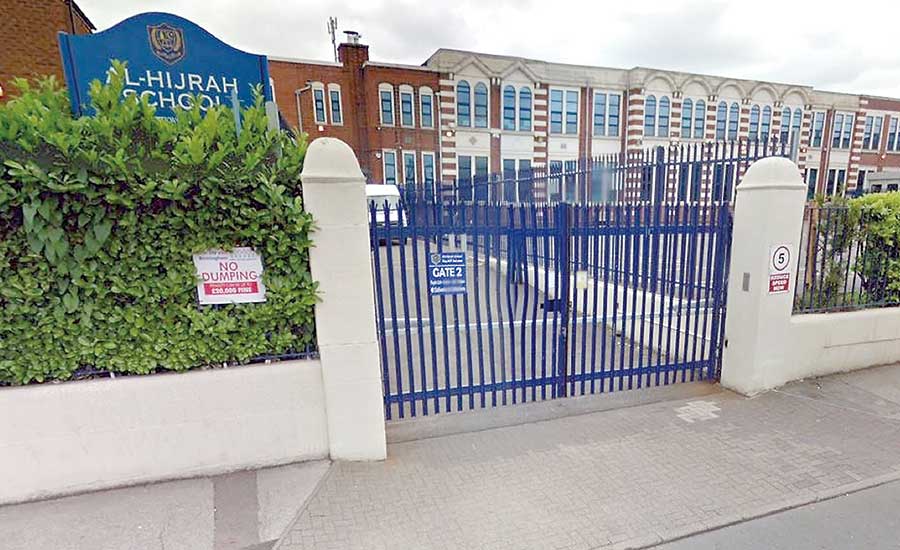ASIA’S ACQUITTAL WELCOMED IN UK
- 10 Nov - 16 Nov, 2018

More than two decades ago, Muslims in Britain started to set up their own schools because they felt that schools in Britain both, state-run and private, were not being able to give their children the sort of Islamic cultural awareness and upbringing they sought for them. This did not apply to all British Muslims, now said to be over 3.5 million in number with the largest single group being of Pakistani origin. The majority were quite happy to send them to mainstream British schools but there was a minority which felt that these schools were taking their children away from their root culture. There are now well over 150 such schools operating, and although quite a few sections of the local population were against such schools, it was difficult to disallow Islamic faith schools when Jewish and Christian, both Church of England and Roman Catholic, faith schools were being allowed to function.
This project, which was so essential for some members of the British Muslim community, has now dealt a serious blow with a ruling by the Court of Appeals that an Islamic school in Birmingham, the Al-Hajirah School, had been guilty of unlawful discrimination by separating boys and girls, which, the court felt, did not adequately prepare the children for life in British society where such segregation is not practiced.
The school’s lawyers argued in court that the segregation was one of its defining characteristics. They said the policy was clear to parents who wished to send their children there and to previous Ofsted inspectors, who had never raised it as a concern. That did not cut much ice with the court, beyond the direction that given this previous tacit acceptance of the school’s policies, they should be given adequate time to correct themselves.
Ofsted argued that the school had breached the 2010 Equalities Act by strictly segregating pupils from the age of nine, teaching them in different classrooms and making them use separate corridors and play areas.
In its ruling, the court argued: “An individual girl pupil cannot socialise and intermix with a boy pupil because, and only because, of her sex; and an individual boy pupil cannot socialise and intermix with a girl pupil because, and only because, of his sex. Each is, therefore, treated less favourably than would be the case if their sex was different.”
Some Jewish and Christian faith schools will also now be examined more closely by Ofsted, but it would be fair to say that the brunt of the ruling will be felt by Muslim schools. The ruling, however, only applies to co-educational schools and not to separate sex schools of which there are quite a few even within the mainstream community. Many grammar schools have separate schools for boys and girls and in other than a strictly legal sense, it is difficult to see how the court’s reasoning does not apply to these schools. Apparently, single sex schools are given a specific exemption from discrimination claims under the Equalities Act but the wider social argument, that segregation makes both sexes suffer from the absence of the other, would not appear to be addressed by any such exemption.
In keeping with the general attitude towards Muslims, the British National Party (BNP) has launched a campaign against what it said were proposed plans for a mosque in the Lincolnshire town of Louth, expressing apprehensions that career politicians in Louth would give in to demands because they put the interests of Muslims first. The matter was perhaps responsible for more heat than light till the East Lindsey District Council revealed to the press that no such application had been received. That did not dampen the ardour of the BNP activists one bit, who dismissed the denial as part of a Labour-led conspiracy and retorted: ‘Our campaign involves asking local residents to gauge the level of support against a new mosque in Louth at this time because once planning permission is granted, it’s too late.’
The far-right group is active in the business of distributing pamphlets, one of which apparently called for all foreign aid to be stopped till potholes in local roads had been filled up. And while that may sound funny, it actually highlights a growing dichotomy in Britain with the state desperately trying to show the world that its glory days are not altogether gone, while the state of some of its very basic internal services show just how far back in the past its days of imperial glory lie. We had no snow last winter, yet the state of some of the roads in the town of Swanley where I live, would probably not be deemed acceptable in Toba Tek Singh – with no disrespect to the goodly town of Toba Tek Singh, whatsoever.
But the main point here is not about the roads of either Swanley or Toba Tek Singh, it is to highlight the deep antipathy towards the Muslim community and since the largest component of this community is from Pakistan, the spillover goes to Pakistan. One would like to think that the recent rescue by the Pakistan Army of a western couple and their children from the captivity of the Taliban could be the start of a better journey in this regard, but years of negativity will take more than one incident to be effectively counter-balanced. •
COMMENTS